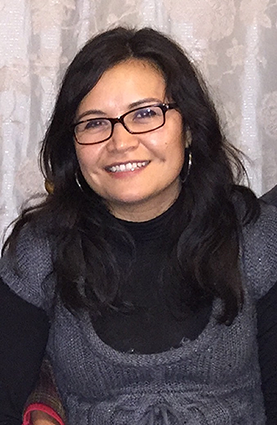DACA is helping Maria realize her dream of serving her community
By David Castillo, New Media Manager, NCLR
Though Maria Garcia has lived in the United States for 20 years, it is only during the past couple that the pursuit of the American dream seemed within reach.
In 1995, Maria's mother fled Mexico to escape an abusive and alcoholic husband. She brought the three youngest of her seven children to Delaware. Maria was the baby. Maria's uncle had gone there for work in the 1980s, so it seemed like a natural place for Maria's mother to take her family.
Maria was an excellent student. She excelled at all her subjects, especially her favorites: math and reading. It was during a visit from mentors in middle school that she decided what her future plans would entail. Maria told her counselors that she wanted to go to college. 
Despite her undocumented status, Maria secured assurances from the University of Delaware that she could apply. The exorbitant costs of higher education, however, almost kept her from attending. Maria's status made her ineligible for any federal financial aid. Even most private loans were not an option, as many require legal permanent resident status.
With the help of friends and family and her tenacious spirit, Maria was able to land a full scholarship. It was exciting news, but her undocumented status would rear its head again throughout college and after.
"I had in my mind that by the time I graduated I would have my papers. But that was not the case," said Garcia.
Maria graduated in 2005 and was ready to start her life. Armed with a double major and a willingness to contribute, her immigration status cut her dreams short, keeping her from finding substantive work. She took a job as a cashier to make ends meet. Maria had also started a master's program, but her meager earnings made it difficult to pay tuition. Eventually she was forced to drop out. Maria had often questioned why she even went to college, but she also held on to hope that things would get better and that one day she would get her papers.
In 2012 that hope proved worthwhile. That year, President Obama announced the formation of the Deferred Action for Childhood Arrivals (DACA) program. By May of 2013, Maria had received her permit and she was on her way to making her dreams come true.
Maria still recalls the day she heard the news, which came from her cousin.
"She was like, 'Oh my god! You won't believe it!' I really didn't. My whole family was calling and texting. It was very exciting news."
Upon receiving her permit, Maria immediately started job hunting in her field. She also started researching masters programs. By October, she found work as a domestic violence coordinator at the Latin American Community Center, an NCLR Affiliate.
For Maria, DACA has truly been transformative.
"I'm able to get a [driver's] license; it gives me more stability with my work," said Garcia. "It just improves my life so much. I'm also in the process of buying a house now, which was something we couldn't do before."
Maria's not finished yet. Her future plans include finishing her advanced degree program in mental health therapy at Widener University. Eventually she plans on working toward a PhD.
None of this would be possible without DACA and without a commitment from policymakers to improve immigrant lives. Maria has message to those in Congress trying to block administrative relief for others like her: "Give us a chance. Do more research on how our workforce is going to help the economy and put less focus on the negative things always said about immigrants. That's not who we are."
This was first posted to the NCLR Blog.

